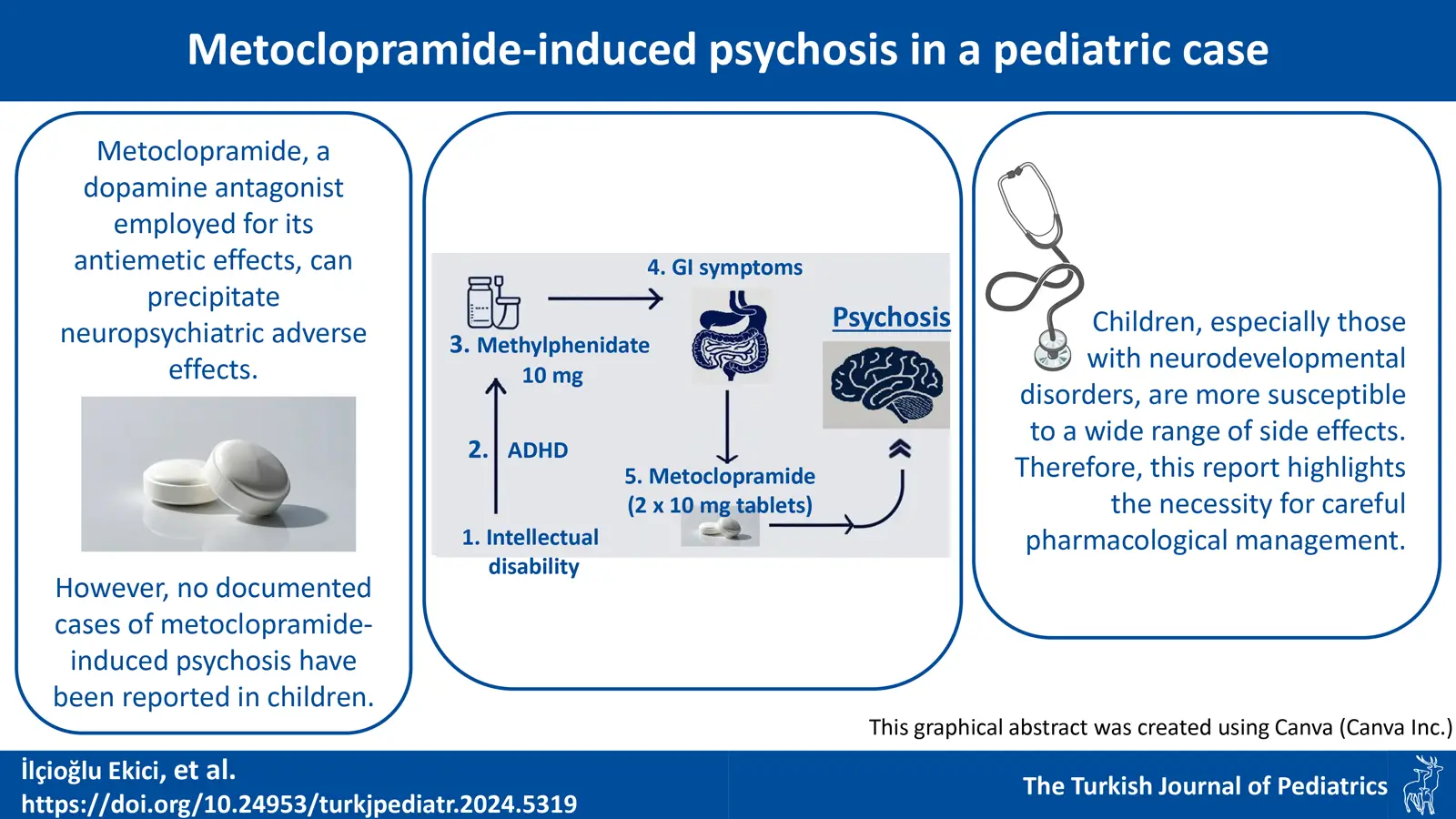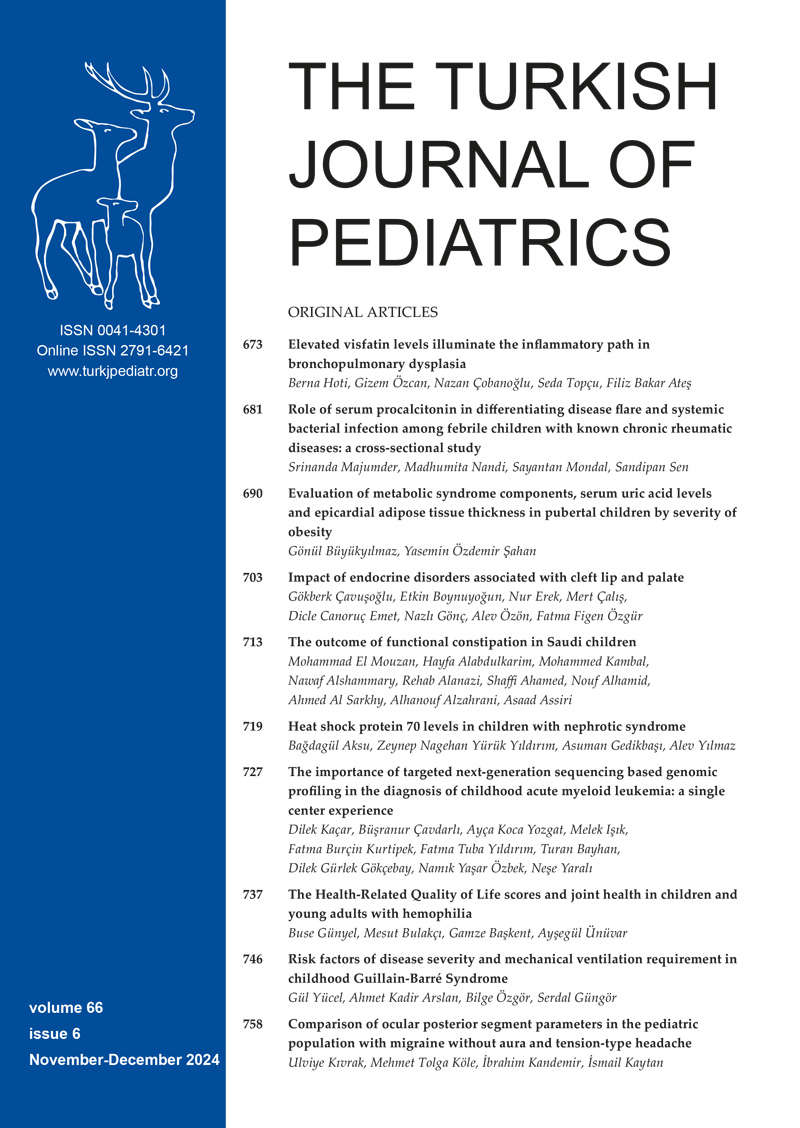Graphical Abstract

Abstract
Background. Metoclopramide, a dopamine antagonist employed for its antiemetic effects, can precipitate neuropsychiatric adverse effects, including extrapyramidal symptoms and, in a few instances, acute psychosis. Although there have been reports of metoclopramide-induced psychosis in elderly individuals, there is no documentation of such incidents in children as far as we are aware.
Case presentation. This case report describes an 11-year-old girl with a history of mild intellectual disability and attention deficit hyperactivity disorder, managed with 10 mg of methylphenidate daily. She presented to the emergency department with acute gastrointestinal symptoms and was administered two tablets of metoclopramide alongside her regular dose of methylphenidate. Subsequently, she developed psychotic symptoms, disorganized behavior, and agitation. An extensive medical evaluation ruled out other organic pathologies, leading to a diagnosis of rapid-onset psychosis induced by metoclopramide. The psychotic episode, which lasted approximately two weeks, resolved with low-dose antipsychotic treatment.
Conclusions. Children, especially those with neurodevelopmental disorders, are more susceptible to a wide range of side effects. Therefore, this report highlights the necessity for careful pharmacological management. Additionally, this case represents a significant contribution to the scientific literature by being the first to document metoclopramide-induced acute psychosis in children to the best of our knowledge.
Keywords: metoclopramide, acute psychosis, children, adverse drug reactions
References
- Bramble D. Psychopharmacology in children with intellectual disability. Adv Psychiatr Treat 2011; 17: 32-40. https://doi.org/10.1192/apt.bp.108.005587
- Beau-Lejdstrom R, Douglas I, Evans SJ, Smeeth L. Latest trends in ADHD drug prescribing patterns in children in the UK: prevalence, incidence and persistence. BMJ Open 2016; 6: e010508. https://doi.org/10.1136/bmjopen-2015-010508
- Miller J, Perera B, Shankar R. Clinical guidance on pharmacotherapy for the treatment of attention-deficit hyperactivity disorder (ADHD) for people with intellectual disability. Expert Opin Pharmacother 2020; 21: 1897-1913. https://doi.org/10.1080/14656566.2020.1790524
- Rapport MD, Moffitt C. Attention deficit/hyperactivity disorder and methylphenidate. A review of height/weight, cardiovascular, and somatic complaint side effects. Clin Psychol Rev 2002; 22: 1107-1131. https://doi.org/10.1016/s0272-7358(02)00129-0
- Pasha K, Paul S, Abbas MS, et al. Psychosis induced by methylphenidate in children and young patients with attention-deficit hyperactivity disorder. Cureus 2023; 15: e34299. https://doi.org/10.7759/cureus.34299
- Lee A, Kuo B. Metoclopramide in the treatment of diabetic gastroparesis. Expert Rev Endocrinol Metab 2010; 5: 653-662. https://doi.org/10.1586/eem.10.41
- Pasricha PJ, Pehlivanov N, Sugumar A, Jankovic J. Drug insight: from disturbed motility to disordered movement-a review of the clinical benefits and medicolegal risks of metoclopramide. Nat Clin Pract Gastroenterol Hepatol 2006; 3: 138-148. https://doi.org/10.1038/ncpgasthep0442
- Elendu C, Adenikinju J, Ogala F, Ologunde T, Adebambo S, Egbunu E. Metoclopramide-induced acute dystonic reaction: a pediatric case report. Medicine (Baltimore) 2023; 102: e36140. https://doi.org/10.1097/MD.0000000000036140
- Dahl E, Diskin AL. Long-lasting adverse effects after short-term low-dose treatment with metoclopramide for vomiting. Int Marit Health 2014; 65: 16-19. https://doi.org/10.5603/MH.2014.0004
- Surawski RJ, Quinn DK. Metoclopramide and homicidal ideation: a case report and literature review. Psychosomatics 2011; 52: 403-409. https://doi.org/10.1016/j.psym.2011.02.001
- Lu ML, Pan JJ, Teng HW, Su KP, Shen WW. Metoclopramide-induced supersensitivity psychosis. Ann Pharmacother 2002; 36: 1387-1390. https://doi.org/10.1345/aph.1A440
- Heal DJ, Pierce DM. Methylphenidate and its isomers: their role in the treatment of attention-deficit hyperactivity disorder using a transdermal delivery system. CNS Drugs 2006; 20: 713-738. https://doi.org/10.2165/00023210-200620090-00002
- Hodgkins P, Setyawan J, Mitra D, et al. Management of ADHD in children across Europe: patient demographics, physician characteristics and treatment patterns. Eur J Pediatr 2013; 172: 895-906. https://doi.org/10.1007/s00431-013-1969-8
- Yanofski J. The dopamine dilemma: using stimulants and antipsychotics concurrently. Psychiatry (Edgmont) 2010; 7: 18-23.
- Leite JV, Guimarães FS, Moreira FA. Aripiprazole, an atypical antipsychotic, prevents the motor hyperactivity induced by psychotomimetics and psychostimulants in mice. Eur J Pharmacol 2008; 578: 222-227. https://doi.org/10.1016/j.ejphar.2007.09.016
- Sabuncuoglu O. Risperidone-to-methylphenidate switch reaction in children: three cases. J Psychopharmacol 2007; 21: 216-219. https://doi.org/10.1177/0269881107069466
- Moncrieff J. Does antipsychotic withdrawal provoke psychosis? Review of the literature on rapid onset psychosis (supersensitivity psychosis) and withdrawal-related relapse. Acta Psychiatr Scand 2006; 114: 3-13. https://doi.org/10.1111/j.1600-0447.2006.00787.x
- Khandaker GM, Barnett JH, White IR, Jones PB. A quantitative meta-analysis of population-based studies of premorbid intelligence and schizophrenia. Schizophr Res 2011; 132: 220-227. https://doi.org/10.1016/j.schres.2011.06.017
- Khandaker GM, Stochl J, Zammit S, Lewis G, Jones PB. A population-based longitudinal study of childhood neurodevelopmental disorders, IQ and subsequent risk of psychotic experiences in adolescence. Psychol Med 2014; 44: 3229-3238. https://doi.org/10.1017/S0033291714000750
- Schmitt A, Falkai P, Papiol S. Neurodevelopmental disturbances in schizophrenia: evidence from genetic and environmental factors. J Neural Transm (Vienna) 2023; 130: 195-205. https://doi.org/10.1007/s00702-022-02567-5
- Murray RM, Bhavsar V, Tripoli G, Howes O. 30 years on: how the neurodevelopmental hypothesis of schizophrenia morphed into the developmental risk factor model of psychosis. Schizophr Bull 2017; 43: 1190-1196. https://doi.org/10.1093/schbul/sbx121
- Eady N, Courtenay K, Strydom A. Pharmacological management of behavioral and psychiatric symptoms in older adults with intellectual disability. Drugs Aging 2015; 32: 95-102. https://doi.org/10.1007/s40266-014-0236-7
- Al-Jadiri A, Al-Jadiry AM. Neurodevelopmental disorders and the role of pharmacotherapy: review and update. Arab J Psychiatr 2020; 31: 1-16. https://doi.org/10.12816/0055578
- Chouinard G, Samaha AN, Chouinard VA, et al. Antipsychotic-induced dopamine supersensitivity psychosis: pharmacology, criteria, and therapy. Psychother Psychosom 2017; 86: 189-219. https://doi.org/10.1159/000477313
- Mosholder AD, Gelperin K, Hammad TA, Phelan K, Johann-Liang R. Hallucinations and other psychotic symptoms associated with the use of attention-deficit/hyperactivity disorder drugs in children. Pediatrics 2009; 123: 611-616. https://doi.org/10.1542/peds.2008-0185
- Ramstad E, Storebø OJ, Gerner T, et al. Hallucinations and other psychotic symptoms in response to methylphenidate in children and adolescents with attention-deficit/hyperactivity disorder: a Cochrane systematic review with meta-analysis and trial sequential analysis. Scand J Child Adolesc Psychiatr Psychol 2018; 6: 52-71. https://doi.org/10.21307/sjcapp-2018-003
- Nevels RM, Weiss NH, Killebrew AE, Gontkovsky ST. Methylphenidate and its under-recognized, underexplained, and serious drug interactions: a review of the literature with heightened concerns. German Journal of Psychiatry 2013; 16: 29-42.
Copyright and license
Copyright © 2024 The Author(s). This is an open access article distributed under the Creative Commons Attribution License (CC BY), which permits unrestricted use, distribution, and reproduction in any medium or format, provided the original work is properly cited.















